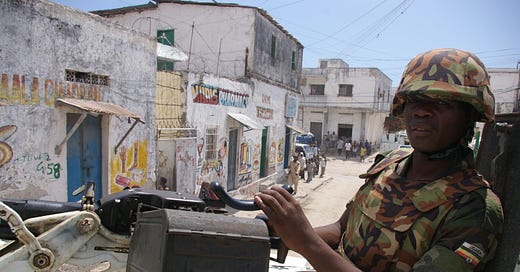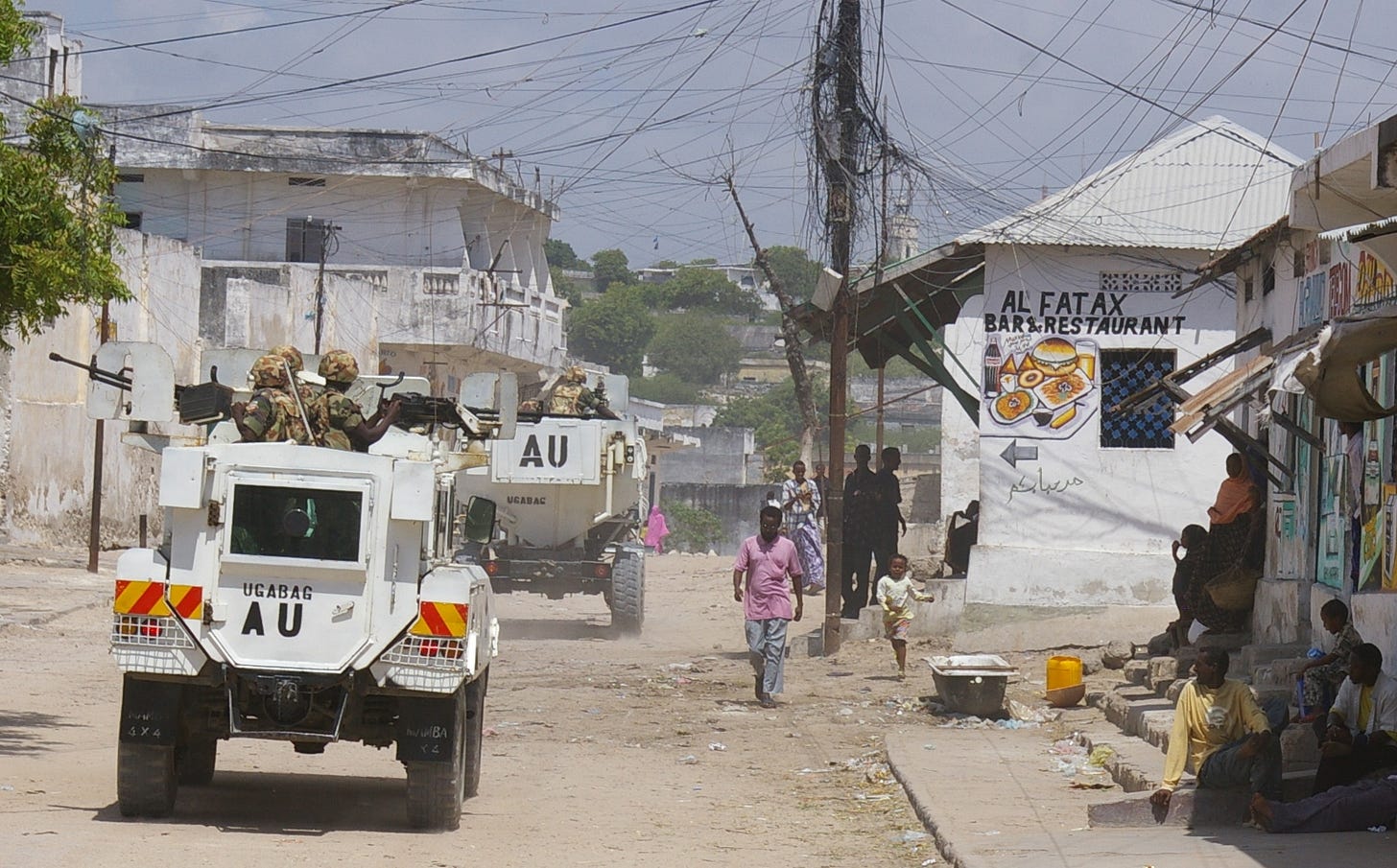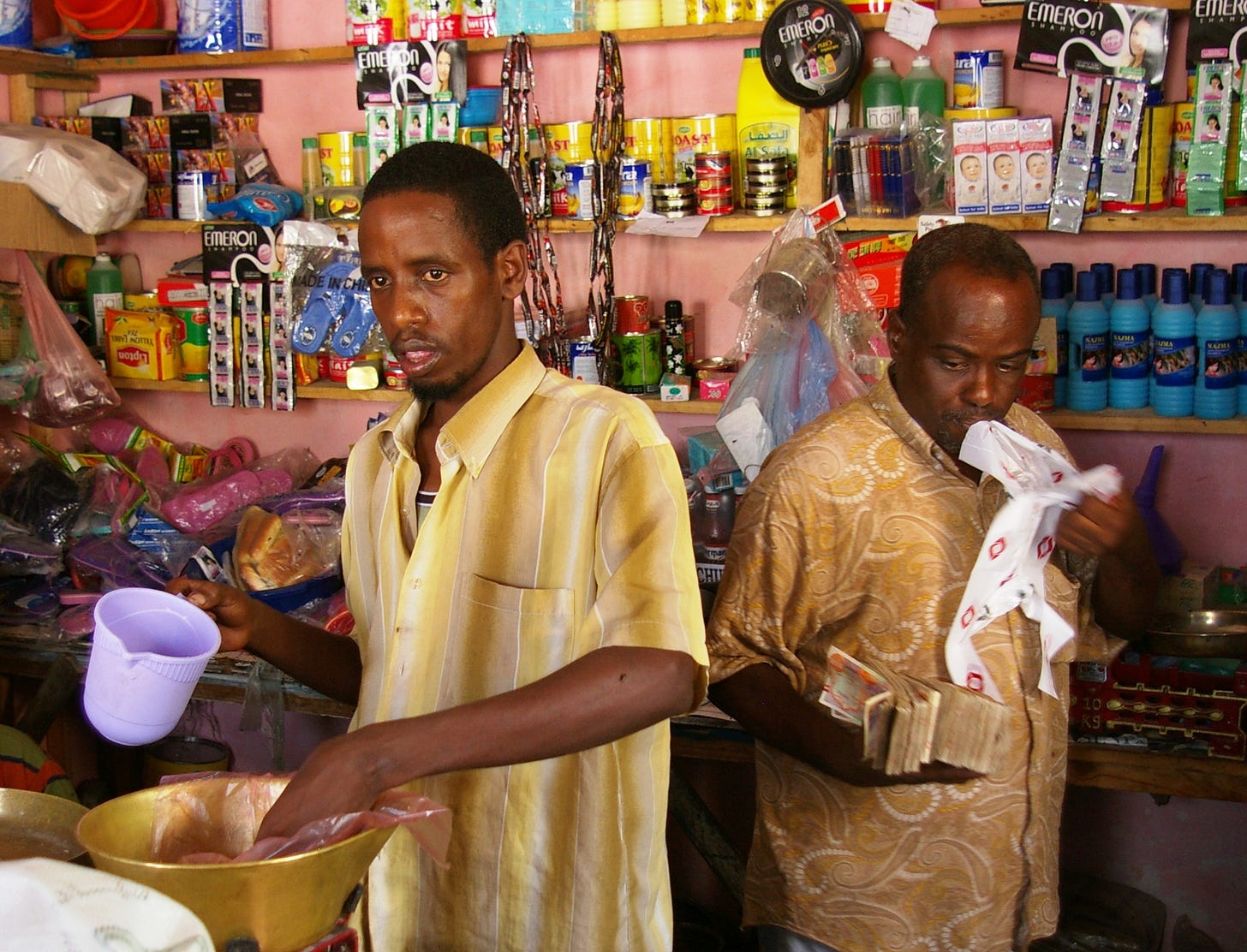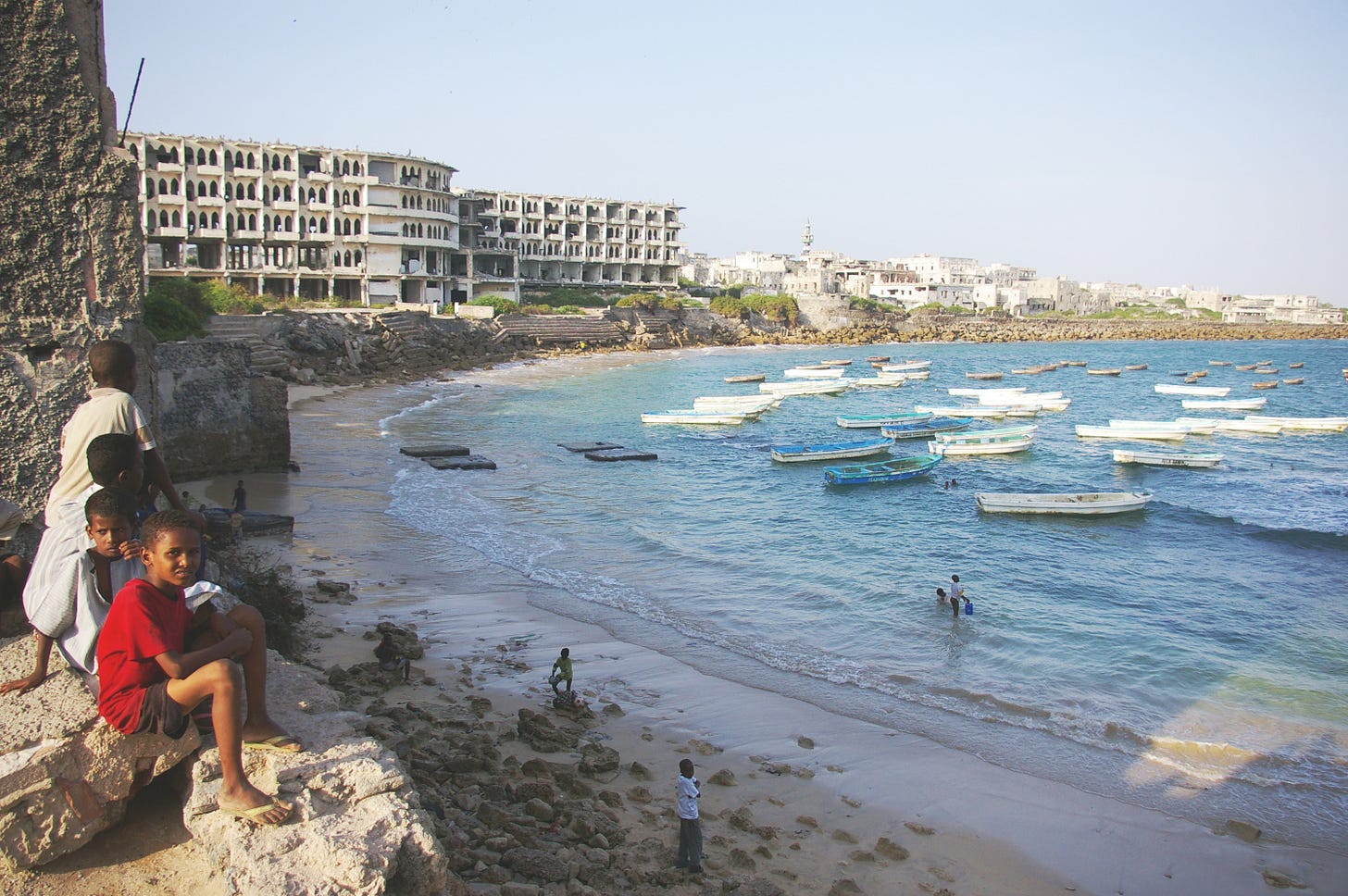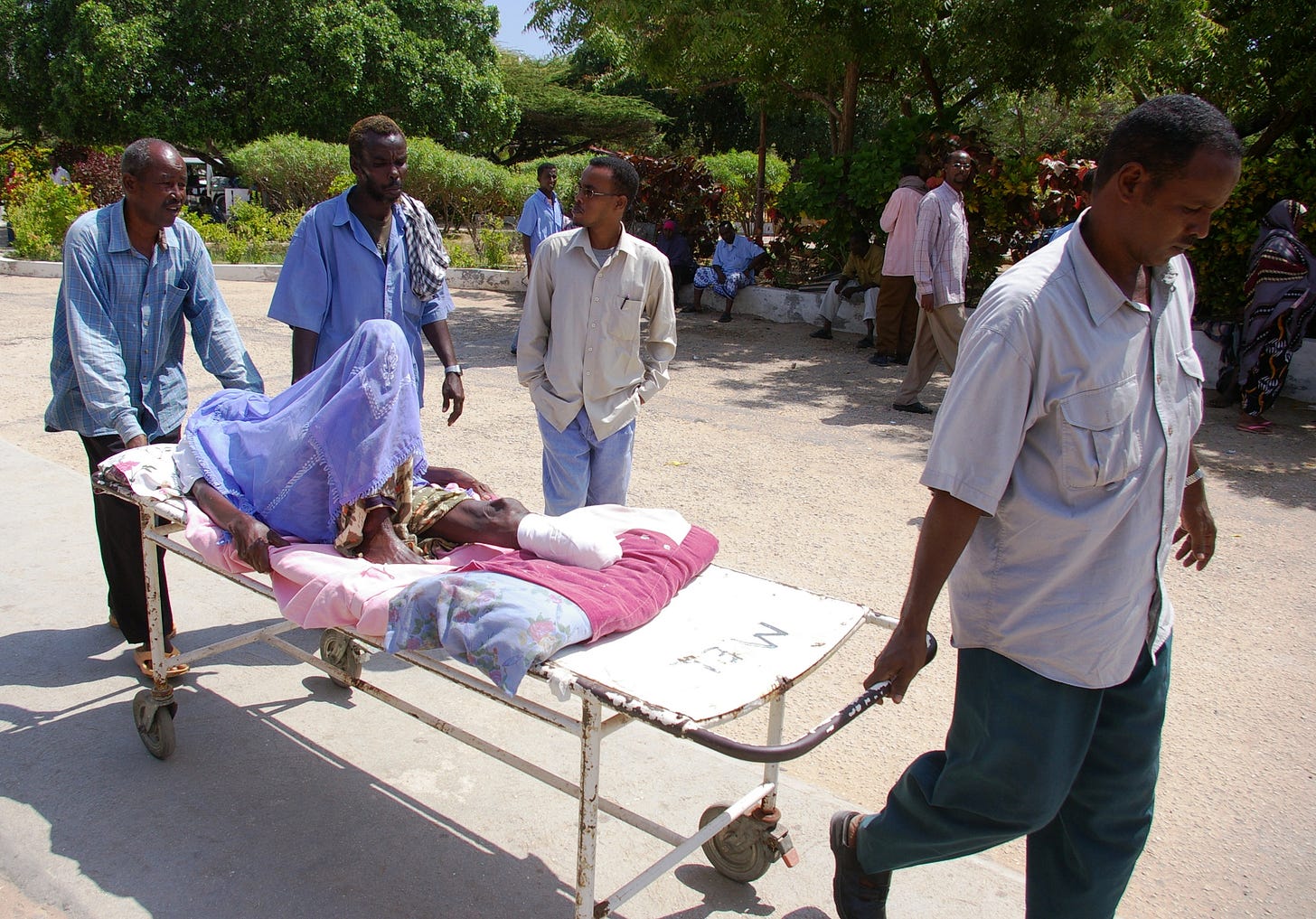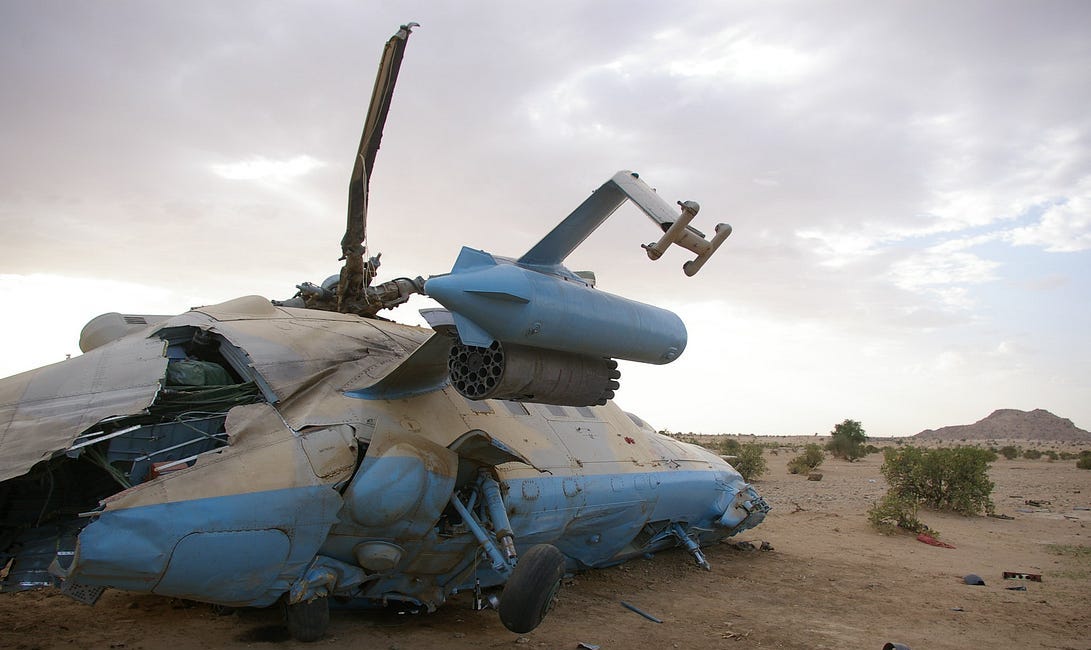What I Learned from a Warlord
When civilization collapsed around him, one Somali businessman took security into his own hands. And for that, we branded him an enemy.
This story originally appeared in Columbia City Paper in 2008.
In Mogadishu, Somalia, where Ali Mohamed Siad is chairman of the once-thriving Bakara Market, just talking to reporters—especially foreigner reporters, especially white foreign reporters—can make you target of any number of dangerous people. Siad did it anyways. He’s that kind of guy.
The kind of guy whose own sense of right and wrong is stronger than that tug we all feel—at home, at work, with friends—to just go along even when it feels wrong. Our need to blend in, play it safe and let someone else make the hard decisions usually keeps us safe. But in a building fire, a stock market crash or some other disaster, our herd instinct can be a kind of passive suicide. It takes a guy like Siad to stand against the panic.
In an age when technology has put more power than ever in individuals’ hands, standing up for what’s right can be more than just a statement. These days you can change the world with a gesture. Siad did, for a while. In doing so, he made enemies of a lot of powerful people, including our own government. But it didn’t have to be that way.
Meet Ali Dere
On a morning in late November, the tall, toothy 65-year-old with the red-dyed beard and the aviator sunglasses climbed into his beat-up white sedan and motored across Mogadishu, navigating the accumulated rubble of 17 years of continuous warfare, weaving around columns of refugees with their possessions on their backs, stopping at military checkpoints so that gunmen sipping narcotic khat tea could decide whether he was worth shaking down for cash. It took him hours to drive just 10 miles to my downtown hotel. En route, he probably considered all the people he might piss off by going on the record with me.
Chief among them: the corrupt, repressive U.S.-backed “transitional government” that’s really just an unpopular alliance of outsider clans. This government has conned the United States into providing cash and diplomatic support by claiming that it’s battling Islamic terrorists hiding out in Somalia. Never mind that there’s little evidence of terrorists—and that the transitional government itself is as repressive and bloody-minded as any terror group.
Siad—known around town by his nickname Ali Dere (“Tall Ali”)—helped me understand all this. We met in the Shamo, one of just a couple hotels in the city that’s fairly safe for white people. It’s a virtual fortress in a hot, seething, starving, dangerous city that barely deserves the term, since these days it’s mostly ruins. In Mogadishu, guns are like fashion accessories and nobody, not anybody, goes out at night.
“I must tell the truth,” Ali Dere said by way of introduction. And then he sat, giant hands folded, at a plastic fold-out table in the Shamo’s dining room, and sketched out Somalia’s complicated problems, ultimately pinning the blame on U.S. policy. He echoed a sentiment I’d heard across Mogadishu: that the U.S. and its clients would destroy an entire city to kill one terror suspect—and that just wasn’t right.
Ali Dere was in a unique position to comment. Time was, he’d been a real heavyweight in Mogadishu, a man with a private army, a bureaucracy overseeing a sizeable local economy, and a sense of justice that he enforced himself.
He would never call himself this, but Ali Dere was a warlord.
Arresting
When I first met him, he certainly looked the part. Tall, almost regal, with a steady gaze that he hid behind sunglasses, Ali Dere had the bearing of a man accustomed to making life-and-death decisions.
Still, there was kindness at the edges. He apologized for showing up late to our meeting, never voicing his perfectly reasonable excuse: that he’d had to dodge drug-addled gunmen en route. He called me “young man,” even though after several years covering the world’s most dangerous places, I sure didn’t feel young.
But compared to him, I really was. Walking down Mogadishu’s ruined streets, it seems like the entire city is inhabited only by children. Empty-eyed and slack-faced, yes, but still children. After decades of fighting, older Somalis all have fled or died. That Ali Dere has lasted to 65 is itself a remarkable feat. By the time I met him he was the head of a huge extended family.
As befitted a man who once had helped rule this teeming, desperate land – one of the poorest and hungriest in the world—Ali Dere appeared fearless. “I know I might be arrested,” he said that day at the Shamo, “but I don’t care.”
Sure enough, just a month after leaving Somalia, I got an email saying Ali Dere had been arrested by government troops.
I wasn’t surprised, but I was deeply sad. I didn’t think we’d see Ali Dere ever again. The transitional government’s “justice” system doesn’t dole out much justice, just torture and—if you believe the rumors—summary execution.
If Ali Dere never returned from prison, to me it would mean more than one man’s demise. It would mean the death of the idea—one I once thought supremely American: that in trying times, resourceful men do what they have to do to protect their families, friends and associates. Sometimes they break the rules. And when there aren’t any rules, sometimes they make their own, as Ali Dere did when he raised an army to protect his market.
That didn’t make him a villain—and it certainly didn’t make him an enemy of the United States. If you ask me, that made Ali Dere a hero.
A tale of 23 markets
Gun battles in the streets. Tanks trading shell fire on the boardwalk outside Mogadishu’s famous Italian-style luxury hotel. Refugees streaming out of the city. Bandits prowling the countryside. Many Somalis recall just flashes from their long civil war that began in 1991 with the overthrow of a corrupt president.
In many ways, Somalia’s civil war was a prototype for a brave new world, one where cheap weapons, lucrative drug trades and black markets, declining natural resources and powerful ethnic hatreds combine to create vast lawless wastes where even the smallest disputes are settled with violence. We see it today in Iraq, Afghanistan, parts of Pakistan, in overlapping regions of Central Africa and, of course, in Somalia, where lately pirates have seized dozens of foreign ships, holding them and their crews for ransom.
Fighting in these places in the last two decades has killed hundreds of thousands of people and made millions more into refugees. The chaos has a way of reducing most people to their basest instincts: run, hide, survive.
But when Somalia fell apart around him 17 years ago, Ali Dere kept his cool. From his Bakara Market-based logistics firm, he watched tribal strongmen arm their thousands of minions with mass-produced Soviet AK-47s and RPGs and carve the country into medieval-style fiefdoms. Then the looting began.
At the time, Ali Dere was chairman of one of Bakara’s 23 clusters of storefronts and retail stalls selling everything from new suits to food to car parts—“shopping centers,” locals call them. As a shopping center chairman, Ali Dere was responsible for his shops’ security, paying young men with guns to guard against other, more dangerous young men with guns.
It was a dicey proposition, arming uneducated, khat-slurping thugs to keep the peace, but in this case it worked. After the first wave of looting, of all the Bakara shopping centers, only Ali Dere’s was untouched. Other shopping center chairmen, previously isolated, together decided to form a market-wide board—and tapped Siad as the first chairman. They hoped he might do for Bakara what earlier he’d done for just his shopping center.
That’s exactly what he did. With an arsenal of nearly 2,000 assault rifles, readily available on the black market, Ali Dere raised a security force big enough to patrol all of Bakara. To pay his troops, he imposed a small tax on businesses. Soon he had the armed force necessary to ward off looters. Ali Dere, as Bakara warlord, had struck an uneasy equilibrium with surrounding warlords and with the U.N. and U.S. peacekeepers who dabbled in the country before being chased out, bloodily, in 1993.
The warlord’s fall
“I am not the sort of person who trusts guns,” Ali Dere said, straight-faced, during our second interview. What he meant, he said, was that he never had personal body guards and never carried his own weapon. On the plus side, going unarmed meant he was “free and can go to anywhere … you can ask anybody,” he said. On the downside, in December 2007 when government troops showed up with orders to arrest him, he had no choice but to submit.
Back in the 1990s, such a thing would have been unthinkable. Then, Ali Dere was still the accepted chief of Bakara Market. He wielded his power for his constituents: his fellow business owners, their staffs and their customers. But all of Somalia benefited. Thanks to modest degree of security that Ali Dere provided, goods trickled into the country and into Somalis’ homes.
Any economist will tell you that prosperity is a function of trade, but trade requires places—virtual or real—where people can get together to do the actual trading. Bakara was that place for a large percentage of Somalia’s 8 million people. There might not have been a functional national government, but Somalis still needed to eat, clothe themselves and treat their illnesses. Ali Dere’s private army made it all possible for many of them.
For several years of warlord rule, there was relative calm in Bakara and, eventually, all of Mogadishu. Somalia still had no real central government, but people made do, and soon a loose alliance of Islamic judges came to dominate the city. They let Ali Dere keep his guns, however. The benevolent warlord was still Bakara’s best hope for peace.
Trouble was brewing. The rise of the Islamic judges gave the outsider northern clans the hook they needed to sucker Washington into backing them as Somalia’s sole legitimate authority. The clans insisted loudly that the judges were actively harboring Al Qaeda—a claim that’s never been proved—and the Bush Administration gave them the green light to launch a major attack, using weapons and troops fronted by Ethiopia.
By spring last year, the judges were on the run and the transitional government was nominally in charge in Mogadishu. The inexperienced, paranoid government troops ordered Ali Dere to disarm. He did so, reluctantly. And no sooner had he handed over the guns than fighters loyal to the deposed judges launched an Iraq-style insurgency, with Bakara as the main battleground. Absent Ali Dere’s private army, Bakara was ripe for open warfare. I’m sure Ali Dere was thinking, I told you so.
Overnight the market became a battleground. Ali Dere and most of his fellow business owners fled to the city’s outskirts, where they lived with their families “under trees with mosquitoes.” They’d left so quickly that many stores’ shelves were still stocked and cash registers still had money in them. But going back to retrieve stuff was risking death.
It all happened so fast: the makeshift society that Ali Dere and other warlords had crafted from the chaos of the civil war fell apart under pressure from a thinly-spread, repressive and unpopular regime whose powerful foreign backers were its only claim to legitimacy. The results were predictably catastrophic. Warlords might be violent small-time dictators, but at least they understand their communities and command local respect—both prerequisites for security in any troubled country.
Without Ali Dere to protect it, Bakara Market was destroyed, and so too the vital economic function it performed. Ali Dere’s disarming coincided with the mass exodus of nearly a million Mogadishu residents, and widespread starvation worse than even that in Darfur. Thousands of Somali men turned to piracy to feed their families. Absent any legitimate authority to prosecute pirates, these seaborne bandits have thrived, earning millions of dollars ransoming captured commercial vessels.
Today an international naval force is assembling off the Somali coast in a bid to deter piracy, but most analysts agree that it will take law and order on land to truly end the pirate threat. Ironically, Washington helped destroy the very people and groups who were Somalia's best hope for security, and the best hope for protecting our own sea trade.
Do-it-yourself justice
Not all warlords are good guys. There have been some truly nightmarish examples of do-it-yourself justice in Somalia’s two-decade melodrama, including Mohamed Farrah Aidid, whose gunmen killed 18 U.S. troops in Mogadishu in 1993. But Ali Dere was nothing like Aidid. Ali Dere, the Bakara Market warlord, was one of the good guys. He wielded brute-force, dictatorial power in the interest of peace and prosperity.
That can be a tough notion for the American mind to wrap itself around. Roads and stoplights, food inspectors, air traffic controllers … there are a hundred services that our government provides and that most of us take for granted—none more so than law, the police, courts and other instruments of justice. Our society has been so orderly for so long, thank God, that we don’t even realize just how bad people can be when you let them. Most of us never have had to take justice into our own hands, and never will.
But Ali Dere didn’t have that luxury. He was faced with a choice: to let his city and his market fall apart around him, or to take responsibility for his people’s security. Like other warlords, he chose the latter. Unlike other warlords, including Aidid, who descended into drug-running, piracy and extortion, Ali Dere wielded his power for good. He provided a safe haven for shoppers and vendors in the midst of lawlessness. His security troops ensured that food, medicine and money flowed. Perhaps thousands of Somalis owe him their lives.
Ali Dere’s choice raises important questions for Americans. Today the Bush Administration’s “war on terror” has ballooned into a “war on suspected terror,” targeting nearly anyone with guns and Islamic tendencies. Solid evidence is unnecessary.
With the transitional government’s tacit approval, the U.S. military has launched air and missile raids on suspected terrorists inside Somalia, killing not just the suspects, but scores of bystanders, as well. In exchange for allowing the raids, the government gets continued U.S. support. The rhetoric coming out of Washington and the transitional government has aligned in recent years. When government troops target potential rivals such as Ali Dere, it’s often under the pretense of helping the U.S. war on terror by “denying terrorists the benefits of security vacuums,” in the words of one West Point-based think tank.
“A stable Somalia under a democratic authority is perhaps the only guarantee of a terrorist-free Somalia,” the Congressional Research Service insisted in 2002. That may very well be true. But when we start confusing desperate men for terrorists, and last-ditch do-it-yourself justice for “security vacuums,” we run the risk of punishing the innocent and, worse, destroying the best hope for short-term peace and safety for millions of people in war-torn countries across the planet. For when government fails, shouldn’t we applaud men for enforcing order the best way they know how?
Men like Ali Dere are life support for nations in chaos. And with the Internet and other cheap technologies plus ever-spreading globalism undermining the traditional nation-state, warlording will only become more widespread. We should pray it never happens here. And in the meantime, we’ve got to learn to separate the good warlords from the bad – the men who lust for brutal power from those who reluctantly assume the same power, but for the good of those around them.
Back from the dead
There’s a happy ending to this story—or at least a less sad one. A couple months after his arrest, Ali Dere reappeared in Mogadishu. He said the arrest merely had been a misunderstanding over property ownership, and that his Baidoa captors “treated [him] like a good chap.”
I didn’t believe him. For after his arrest, Ali Dere was a different man. Gone were the regal bearing and outspokenness. Late last year he had risked his life to criticize Mogadishu’s occupiers and their American puppet master. Now he was claiming that he “absolutely did not” have any problem with the transitional government. And after agreeing to a follow-up interview, Ali Dere, the former warlord of Bakara Market, asked me to spot him $50.
For me, it was like seeing my grandfather cry.
These days he’s all but powerless and, with Bakara a battleground, essentially unemployed. It’s a long way Ali Dere has fallen, from benevolent warlord to cowering beggar. It’s sad, but it’s not unexpected. The winds have shifted. In Somalia, the anarchy of powerful men enforcing their own rules has given way to another, far worse anarchy—that of distantly-controlled occupiers and an ideologically motivated insurgency, both fueled or indirectly enabled by America’s global war against anything even slightly resembling Islamic extremism. The fruit of this anarchy is death, starvation and piracy.
Today in Somalia, a warlord’s lightly armed private security force, however good for local inhabitants, stands no chance. The warlord might very well be the best hope for short-term stability, but with the Pentagon, the CIA and foreign governments arrayed against him, he has no choice but to disarm. And what is a warlord without his guns?
Read more:
Death, Darkness & the Deserters
It started with singing. I was in my sweltering hovel at a guest house in Abeche in eastern Chad on a Friday evening in June 2008 when I heard the women’s voices harmonizing. My photographer Anne bustled over. “Do you hear it? I think it’s a wedding.”


